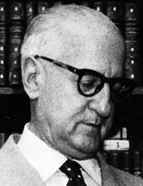

Despite his literary activity and journalistic chronicles, it was in historiography that Octávio Tarquínio de Sousa would make his mark. His first work in this field was A mentalidade da Constituinte (The Mentality of the Constituent Assembly, 1931), a study of the first Brazilian Constituent Assembly, held in 1823. A few years later, a new book would introduce the author to the field of historical biography, which would soon earn him wider recognition. However, in Ernesto Psichari, neto de Renan (Ernesto Psichari, grandson of Renan), published in 1934, Octávio Tarquínio’s style as a biographer was still in its infancy, which would only come to fruition with Bernardo Pereira de Vasconcelos e seu tempo (Bernardo Pereira de Vasconcelos and his time), published in 1937. His definitive conversion to the status of historian-biographer was partly due to the direct influence of Gilberto Freyre. The great Pernambuco sociologist directed the prestigious collection “ Documentos Brasileiros” (Brazilian History, Brazilian Documents) by José Olympio, created the previous year, but which already had two notable authors: Sérgio Buarque de Holanda (with Raízes do Brasil [Roots of Brazil]) and Oliveira Lima (with Memórias [these are my reminiscences]); Freyre commissioned Octávio Tarquínio to write a biography of one of the most influential figures in the construction and consolidation of the Brazilian Empire in the 19th century. Brazil was then under the government of Getúlio Vargas in its phase known as the Estado Novo (New State, 1937-1945), characterised, among other things, by a dictatorial executive power and severe restrictions on individual freedoms. In reaction to this state of affairs, Octávio Tarquínio was able to assert his democratic and liberal convictions by highlighting Bernardo Pereira de Vasconcelos as a constitutional monarchist opposed to the extremes of what the author conceived as absolutist excesses, on the one hand, and revolutionary republicans, on the other, which dominated the political scene of the Brazilian Empire in its early years. From then on, this opposition to the Vargas regime would also find resonance in his broader literary activity, such as during his editorship of Revista do Brasil between 1938 and 1943, and with the founding of the Brazilian Writers’ Association in 1942, together with other important representatives of the Brazilian intellectual and literary landscape of the time, such as Sérgio Buarque de Holanda, Astrojildo Pereira, Graciliano Ramos, José Lins do Rego, Sérgio Milliet, Mário de Andrade, Oswald de Andrade, Paulo Emílio Sales Gomes, Antônio Cândido and Érico Veríssimo. With Octávio Tarquínio as its first president, the ABE held the First Brazilian Writers’ Congress in 1945.
This work is financed by national funds through FCT - Foundation for Science and Technology, I.P, in the scope of the projects UIDB/04311/2020 and UIDP/04311/2020.
